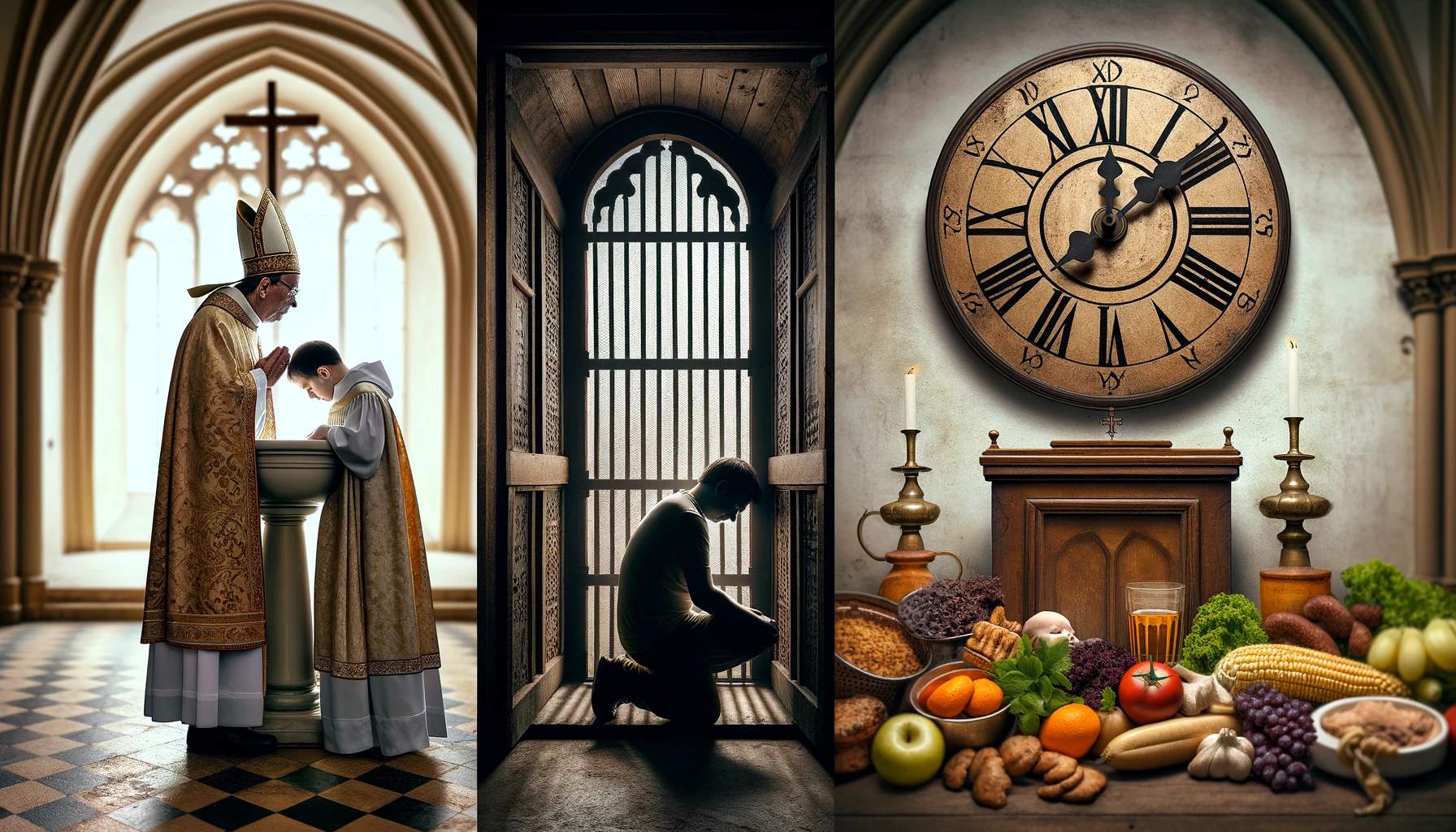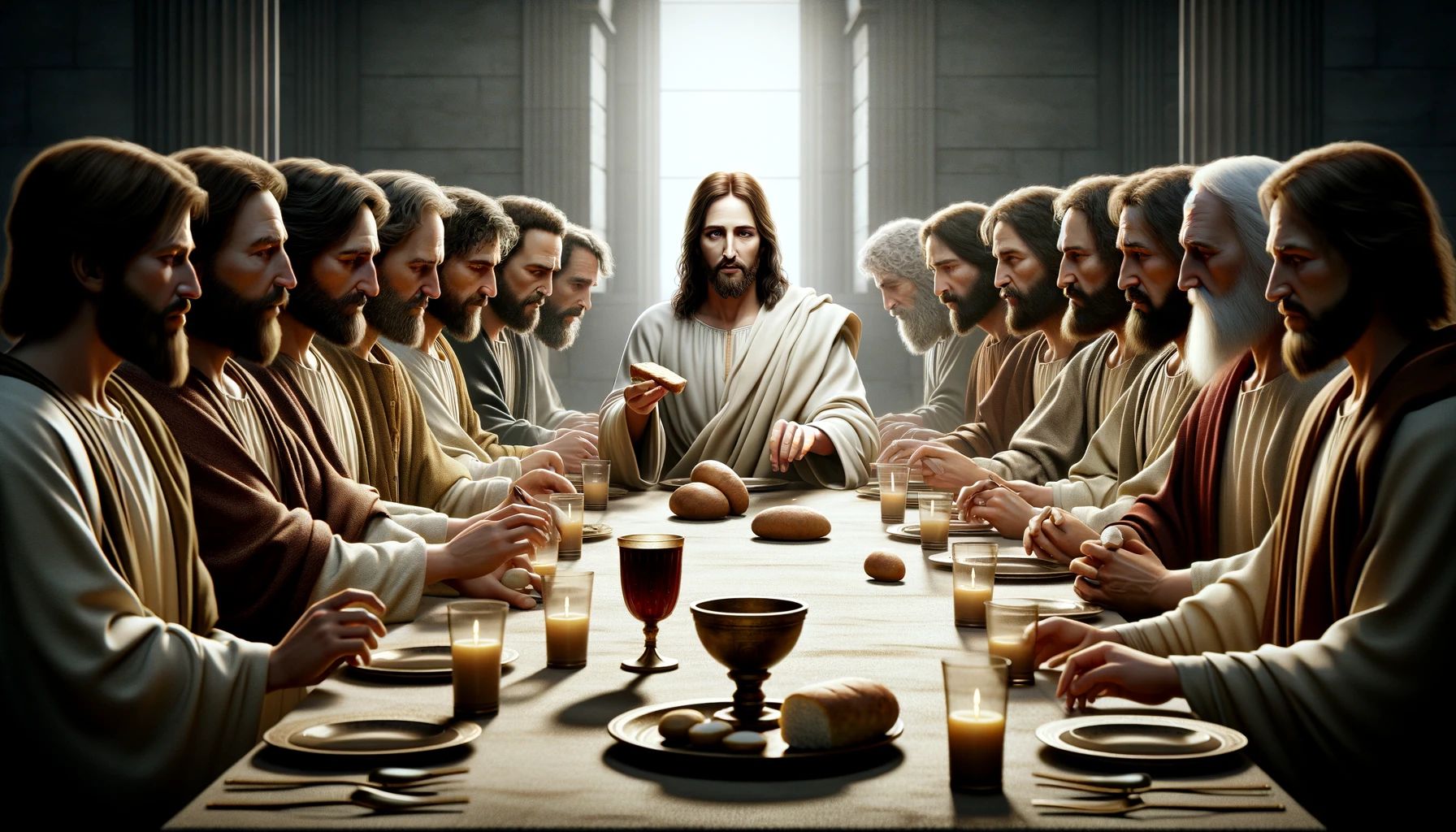Home>Theology and Spirituality>Why Do We Receive The Holy Communion


Theology and Spirituality
Why Do We Receive The Holy Communion
Published: February 24, 2024
Peter Smith, Editorial Director at Christian.net, combines deep insights into faith, politics, and culture to lead content creation that resonates widely. Awarded for his contributions to religious discourse, he previously headed a major organization for religious communicators, enhancing dialogue on faith's societal impacts.
Discover the significance of the Holy Communion in theology and spirituality. Explore the reasons behind receiving this sacred sacrament. Unlock the spiritual depth of communion.
(Many of the links in this article redirect to a specific reviewed product. Your purchase of these products through affiliate links helps to generate commission for Christian.net, at no extra cost. Learn more)
Table of Contents
Introduction
The Holy Communion, also known as the Eucharist or the Lord's Supper, holds a central place in Christian faith and practice. It is a sacred ritual that symbolizes the body and blood of Jesus Christ and is observed by various Christian denominations worldwide. The act of partaking in the Holy Communion is deeply rooted in the teachings of Jesus Christ and has been a cornerstone of Christian worship for centuries.
The significance of the Holy Communion transcends mere religious tradition; it embodies the spiritual connection between believers and their Savior. This sacred practice serves as a poignant reminder of Christ's ultimate sacrifice and the redemptive power of His love. As we delve into the origins, symbolism, and spiritual implications of the Holy Communion, we will uncover the profound depth of its meaning and the transformative impact it has on the lives of believers.
Read more: Why Do We Receive Communion On Good Friday
The Origin of the Holy Communion
The origin of the Holy Communion can be traced back to the Last Supper, a momentous event in Christian history that took place in Jerusalem during the Passover feast. It was here that Jesus Christ, in the company of his disciples, instituted the practice of sharing bread and wine as symbols of his body and blood. This profound act of communion was imbued with spiritual significance and was destined to become a cornerstone of Christian faith and worship.
During the Last Supper, Jesus took bread, blessed it, and broke it, giving it to his disciples, saying, "Take, eat; this is my body." He then took the cup, gave thanks, and offered it to them, saying, "Drink from it, all of you; for this is my blood of the covenant, which is poured out for many for the forgiveness of sins." These words, spoken by Jesus, established the sacred ritual of partaking in the bread and wine as a means of commemorating his sacrificial love and atoning work.
The Last Supper, therefore, serves as the foundational event from which the Holy Communion derives its origin. It was a poignant and transformative moment, as Jesus, fully aware of his impending crucifixion, instituted this symbolic practice to be observed by his followers in remembrance of him. The disciples, unknowingly at the time, were participating in a ritual that would become a central tenet of Christian worship and a profound expression of faith.
The significance of the Last Supper and the establishment of the Holy Communion lies in its representation of the new covenant between God and humanity through the redemptive work of Jesus Christ. This act of sharing bread and wine was not merely a customary observance; it was a profound spiritual enactment that embodied the essence of Christian belief – the sacrificial love of Christ and the promise of salvation for all who partake in faith.
In essence, the origin of the Holy Communion is rooted in the selfless act of Jesus Christ, who, in the final hours before his crucifixion, imparted to his disciples a tangible and enduring way to remember his love, sacrifice, and the eternal hope it brings. This sacred tradition continues to be observed by Christians worldwide, serving as a powerful reminder of the unifying bond between believers and their Savior.
The Significance of the Holy Communion in Christianity
The Holy Communion holds profound significance in Christianity, serving as a pivotal expression of faith, unity, and spiritual nourishment for believers. At its core, the act of partaking in the Holy Communion embodies the central tenets of Christian theology and offers a tangible connection to the redemptive work of Jesus Christ.
One of the primary facets of the Holy Communion's significance lies in its role as a sacred remembrance of Christ's sacrificial love. As Christians partake in the bread and wine, they engage in a profound act of commemoration, reflecting on the selfless offering of Christ's body and blood for the forgiveness of sins. This solemn remembrance serves as a poignant affirmation of the foundational Christian belief in the atoning work of Jesus, underscoring the transformative power of His sacrifice and the promise of redemption for humanity.
Furthermore, the Holy Communion serves as a unifying force within the Christian community. As believers gather to partake in this sacred ritual, they are bound together by their shared faith in Christ and their participation in a timeless tradition that transcends denominational boundaries. This communal aspect of the Holy Communion fosters a sense of spiritual kinship and solidarity among believers, reinforcing the interconnectedness of the body of Christ and the collective identity of the Church.
In addition to its role as a symbol of remembrance and unity, the Holy Communion holds deep spiritual significance as a source of nourishment for the soul. In partaking of the bread and wine, believers symbolically partake of the spiritual sustenance offered by Christ, finding sustenance and renewal in His enduring presence. This spiritual nourishment serves to fortify the faith of believers, providing them with strength, comfort, and a profound sense of communion with their Savior.
Moreover, the Holy Communion serves as a profound expression of gratitude and worship. Through this sacred act, believers express their reverence for Christ's sacrifice and their gratitude for the unmerited gift of salvation. The act of partaking in the bread and wine becomes a deeply personal and reverent form of worship, allowing individuals to express their devotion and adoration for the Savior in a tangible and deeply meaningful manner.
In essence, the significance of the Holy Communion in Christianity is multifaceted, encompassing themes of remembrance, unity, spiritual nourishment, and worship. This sacred ritual stands as a timeless testament to the foundational truths of the Christian faith, offering believers a tangible and transformative encounter with the redemptive love of Jesus Christ.
The Spiritual Benefits of Receiving the Holy Communion
Partaking in the Holy Communion offers profound spiritual benefits that resonate deeply with believers, enriching their faith and fostering a transformative connection with the divine. The act of receiving the bread and wine during this sacred ritual holds the potential to imbue individuals with spiritual nourishment, renewal, and a profound sense of communion with Christ.
One of the primary spiritual benefits of receiving the Holy Communion lies in the opportunity for believers to experience a tangible encounter with the presence of Christ. As they partake in the bread and wine, believers engage in a deeply personal and intimate communion with their Savior, experiencing His abiding love and grace in a profound and transformative manner. This encounter serves to deepen their spiritual connection with Christ, fostering a sense of closeness and intimacy that transcends the ordinary boundaries of human experience.
Furthermore, the Holy Communion serves as a means of spiritual nourishment for the soul. As believers partake in the elements, they symbolically receive the spiritual sustenance offered by Christ, finding renewal, strength, and sustenance for their faith. This spiritual nourishment serves to invigorate and fortify believers, providing them with a profound sense of inner renewal and empowerment as they continue their spiritual journey.
In addition, the act of receiving the Holy Communion can bring about a deep sense of spiritual cleansing and renewal. As believers approach the table to partake in the bread and wine, they are invited to reflect on their lives, seek forgiveness, and experience a profound sense of spiritual cleansing. This act of self-examination and repentance can lead to a renewed sense of spiritual wholeness and a deepened awareness of God's redemptive love and grace.
Moreover, the Holy Communion offers believers a transformative experience of unity with the body of Christ. As they partake in this sacred ritual alongside fellow believers, they are reminded of their interconnectedness and shared identity as members of the Christian community. This communal aspect of the Holy Communion fosters a sense of spiritual kinship and solidarity, reinforcing the collective identity of the Church and nurturing a deep sense of belonging and unity among believers.
In essence, the spiritual benefits of receiving the Holy Communion are multifaceted, encompassing themes of spiritual encounter, nourishment, renewal, cleansing, and unity. This sacred practice holds the potential to enrich the spiritual lives of believers, offering them a transformative experience of communion with Christ and fostering a deepened sense of spiritual vitality and connectedness within the Christian community.
The Symbolism of the Bread and Wine
The symbolism of the bread and wine in the Holy Communion holds profound significance within Christian theology, representing the core tenets of the faith and serving as powerful emblems of Christ's sacrificial love and redemptive work.
The bread, when shared during the Holy Communion, symbolizes the body of Jesus Christ. It serves as a tangible representation of Christ's selfless sacrifice and the offering of his body for the salvation of humanity. As believers partake of the bread, they are invited to reflect on the profound act of love and atonement embodied in Christ's sacrificial death on the cross. The broken bread serves as a poignant reminder of Christ's willingness to endure suffering and offer himself as a living sacrifice for the forgiveness of sins, underscoring the foundational Christian belief in the redemptive power of Christ's body broken for the salvation of humanity.
Similarly, the wine in the Holy Communion symbolizes the blood of Jesus Christ, signifying the new covenant between God and humanity through the shedding of Christ's blood for the remission of sins. As believers partake of the cup, they are invited to contemplate the profound significance of Christ's blood, which was poured out as a testament to God's unyielding love and the promise of eternal redemption. The shared cup serves as a powerful symbol of the transformative nature of Christ's sacrifice, offering believers a tangible connection to the redemptive work of the Savior and the eternal hope it brings.
The symbolism of the bread and wine in the Holy Communion extends beyond mere representation; it embodies the foundational truths of Christian faith, encapsulating the profound love, sacrifice, and redemptive power of Jesus Christ. Through the shared act of partaking in the bread and wine, believers are invited to enter into a deeply meaningful and transformative encounter with the enduring presence of Christ, finding spiritual nourishment, renewal, and a profound sense of communion with their Savior.
In essence, the symbolism of the bread and wine in the Holy Communion serves as a poignant and enduring testament to the foundational truths of the Christian faith, offering believers a tangible and transformative connection to the sacrificial love and redemptive work of Jesus Christ.
Read more: How Do You Receive Holy Communion
The Importance of Remembering Christ's Sacrifice
The act of remembering Christ's sacrifice holds profound significance within the context of the Holy Communion, serving as a poignant and transformative reminder of the selfless love and redemptive work of Jesus Christ. At the heart of Christian faith lies the foundational truth of Christ's sacrificial death on the cross, an act of unparalleled love and atonement that forms the cornerstone of the Christian message.
The importance of remembering Christ's sacrifice during the Holy Communion cannot be overstated. It serves as a solemn and reverent acknowledgment of the profound depths of Christ's love for humanity, encapsulating the essence of God's redemptive plan for the salvation of humanity. As believers partake in the bread and wine, they are invited to reflect on the enduring significance of Christ's sacrifice, contemplating the immeasurable cost of His love and the transformative power it holds for all who believe.
Furthermore, the act of remembering Christ's sacrifice fosters a deep sense of gratitude and reverence within the hearts of believers. As they engage in this sacred ritual, they are prompted to consider the immense personal cost borne by Christ on their behalf, leading to a profound sense of awe and thankfulness for the unmerited gift of salvation. This act of remembrance becomes a deeply personal and reverent form of worship, allowing individuals to express their devotion and adoration for the Savior in a tangible and deeply meaningful manner.
Moreover, the importance of remembering Christ's sacrifice lies in its capacity to engender a profound sense of spiritual transformation within believers. As they contemplate the selfless love and atoning work of Christ, they are invited to consider the implications of His sacrifice for their own lives, leading to a deepened awareness of God's redemptive grace and the transformative power of His love. This act of remembrance becomes a catalyst for spiritual renewal, inspiring believers to embrace the profound implications of Christ's sacrifice and to live in light of the eternal hope it brings.
In essence, the importance of remembering Christ's sacrifice during the Holy Communion lies in its capacity to evoke a deeply personal and transformative encounter with the redemptive love of Jesus Christ. This sacred act of remembrance serves as a poignant affirmation of the foundational Christian belief in the atoning work of Christ, offering believers a tangible and transformative encounter with the enduring significance of His sacrifice.
The Act of Communion as a Form of Worship
The act of communion, as observed in the Christian tradition, holds a profound significance as a form of worship. It transcends mere ritualistic practice and embodies a deeply spiritual and transformative expression of devotion, reverence, and intimate communion with the divine.
At its core, the act of communion serves as a poignant and reverent form of worship, allowing believers to engage in a tangible and deeply meaningful encounter with the redemptive love of Jesus Christ. As individuals partake in the bread and wine, they enter into a sacred space of worship, where they express their gratitude, adoration, and reverence for the Savior in a deeply personal and intimate manner.
The act of communion becomes a solemn and reverent expression of devotion, as believers reflect on the sacrificial love and atoning work of Christ. It serves as a tangible affirmation of their faith and a profound acknowledgment of the enduring significance of Christ's sacrifice for the forgiveness of sins. Through the shared act of partaking in the bread and wine, believers offer their hearts in worship, expressing their deep-seated reverence for the transformative power of Christ's love and the eternal hope it brings.
Furthermore, the act of communion as a form of worship fosters a sense of spiritual intimacy and communion with Christ. As believers partake in the elements, they engage in a deeply personal encounter with the enduring presence of the Savior, finding solace, renewal, and a profound sense of communion with the divine. This intimate communion becomes a sacred expression of worship, as individuals open their hearts to the transformative love and grace of Christ, finding spiritual nourishment and renewal in His enduring presence.
Moreover, the act of communion as a form of worship serves to unite believers in a collective expression of reverence and adoration for the Savior. As the Christian community gathers to partake in this sacred ritual, they are bound together by their shared devotion and worship, fostering a sense of spiritual kinship and solidarity. This communal aspect of the act of communion becomes a unifying force, reinforcing the interconnectedness of the body of Christ and nurturing a deep sense of collective worship and adoration for the Savior.
In essence, the act of communion serves as a profound and transformative form of worship, allowing believers to express their devotion, reverence, and intimate communion with the redemptive love of Jesus Christ. This sacred ritual becomes a poignant and deeply meaningful expression of worship, fostering a sense of spiritual intimacy, unity, and collective adoration for the Savior within the Christian community.
Conclusion
The Holy Communion stands as a timeless and sacred practice that embodies the foundational truths of the Christian faith. From its origins in the Last Supper to its enduring significance in contemporary Christian worship, the act of partaking in the bread and wine holds profound spiritual and symbolic meaning for believers. As we reflect on the rich tapestry of the Holy Communion, we are reminded of its multifaceted significance as a testament to Christ's sacrificial love, a source of spiritual nourishment, a symbol of unity, and a transformative form of worship.
At its core, the Holy Communion serves as a poignant and tangible remembrance of Christ's sacrificial love, inviting believers to reflect on the enduring significance of His atoning work. It stands as a powerful symbol of unity, fostering a sense of spiritual kinship and solidarity within the Christian community. Moreover, the act of receiving the Holy Communion offers believers a transformative encounter with the enduring presence of Christ, providing spiritual nourishment, renewal, and a profound sense of communion with the divine.
The symbolism of the bread and wine in the Holy Communion encapsulates the core tenets of Christian theology, serving as powerful emblems of Christ's sacrificial love and redemptive work. Through the shared act of partaking in the bread and wine, believers are invited to enter into a deeply meaningful and transformative encounter with the enduring presence of Christ, finding spiritual nourishment, renewal, and a profound sense of communion with their Savior.
In conclusion, the Holy Communion stands as a timeless testament to the foundational truths of the Christian faith, offering believers a tangible and transformative connection to the sacrificial love and redemptive work of Jesus Christ. As believers partake in this sacred ritual, they are invited to enter into a deeply meaningful and intimate communion with their Savior, finding spiritual nourishment, renewal, and a profound sense of unity within the Christian community. The Holy Communion, therefore, remains a sacred and enduring expression of faith, offering believers a tangible encounter with the redemptive love of Jesus Christ and fostering a deepened sense of spiritual vitality and connectedness within the body of Christ.














